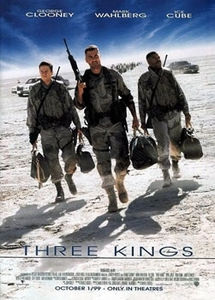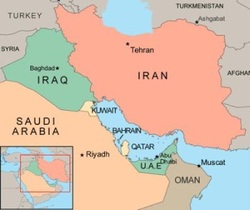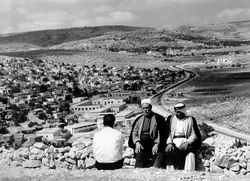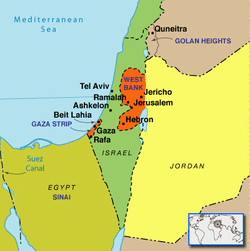 The movie Three Kings takes place during the Iraqi uprising against Saddam that follows the First Gulf War. The four main characters are Troy Barlow, Conrad Vig, Chief Elgin, and Archie Gates. To start the events Troy and Conrad find a map which they show to chief Elgin. Archie then looks at the map and convinces the others that it shows where the Kuwait gold the Iraq stole is located. The next day they set out for this gold. With the ceasefire that was ordered from President Bush they manage to take the bunker without shots being fired. They find the gold among with many other objects that were taken from Kuwait. At the bunker there is an Iraqi rebel leader being interrogated. His wife who is pleading for help then gets shot. Archie decides that he and the others have to help this man and the other people. They then violate the ceasefire as they rescue some prisoners and leave the area just as Iraqi reinforcements arrive. The Iraqis then attempt to gas the Americans and the prisoners while they are driving away through a minefield. The Americans are separated and Troy is then captured by the Iraqi Republican Guard while the rest are saved by a group of rebels. The rebels help them save the gold too. The Americans agree to help the Iraqis get the Iranian border once they save Troy. Troy had been taken back to the bunker to be tortured and interrogated. He manages to call his wife while he is there and gives her his position to send the American army. The other three Americans and the rebels find cars and pretend to be an angry Saddam and his army to scare the bunkers guards away. There they manage to save Troy but he and Conrad are both shot outside of the bunker. Troy survives but Conrad does not. Archie then manages to radio another American from the army for transport and the reporter Adriana. However, the American army arrives as the three men are helping get the Iraqi rebels cross the Iranian border. They end up having to show the American army the gold so that they will allow them to help the Iraqi rebels through. The soldiers then end up not getting charged due to Adriana’s reporting. The three Americans then make it home safely and, perhaps with the help of the gold, live a good life.
 The conflict between Iran and Iraq was largely based on religion. It occurred from roughly 1980 until 1990 when the UN stepped in to solve the issue. Iran had just had and was going through the Shiite Islam revolution. Iraq under the leadership of Saddam
Hussein feared that the revolution would spread to Iraq especially considering
that there were many people in Iraq who were Shiite Islam. This war was therefore mainly a religious war although the two countries did also claim to have territory within the others boundaries. In August 1990 Iraq invaded Kuwait. It was the first Persian Gulf War. This was a territorial and resource based attack. 30 countries,
including some Arab countries, formed a coalition against Iraq. The U.S.A. was quite involved with this event yet all of their actions were carefully planned, such as making sure Israel did not get involved, so that they would not lose the Arab support. After 4 days Kuwait was liberated. There had been about 90,000 Iraqi casualties. The Iran Iraq war was
largely influenced by religion and the first Persian Gulf War was largely for
resources and economics along with pride for Iraq.
 The Israeli war of Independence, the Suez Canal Crisis, the Six
Days War, and the Yom Kippur War all had major impact on the Middle East. The Israeli War of Independence
occurred right after the partition of the Palestine area. The Israelis quickly attacked their Arab neighbours and expanded their territory on their strike-first principle. The gain in territory for Israeli was also the cause of many Palestinians becoming refugees. The Suez Canal Crisis was the next Arab-Israeli conflict.
The conflict was between Israel and Egypt. The British and French supported Israel while Russia supported
Egypt. The issue was finally
resolved by the UN. The main
outcome of the Suez Canal Crisis was that the influencers of the area became
Russia and the U.S. instead of Britain and France. The security of the canal also helped for the economy of Israel to
flourish. The next conflict, the
Six Days War of 1967, was also between Israel and Egypt. Egypt expels the UN troops from the canal zones and prepares for war with Israel. The Israelis once
again attack first and manage to gain large amounts of territory once
again. In fear of an escalating
war the U.S. steps in to help the conflict. This war ends with the influence of the
U.S. and with Israeli having a larger territory. The final of the four events was the Yom Kippur War of 1973. The
Egyptians make the original gains but Israel manages to regain their land with
aid from the U.S. The borders
remained unchanged. At the end of
this war the Egyptians and Arabs realize that they need another way of war
against Israel. OPEC raises the
price of oil by 70% which causes a worldwide financial crisis. This war creates a change from basically religious and territorial wars and conflicts to resources based wars and conflicts.
 The very roots of the Arab-Israeli conflicts are religious differences and territorial disputes. Through the 1900s other countries intervened with the original issues which often did not help the situation. During the First World War both Great Britain and France affected the Middle East. Basically the Ottoman Empire was divided between these two countries. France had the areas of Lebanon and Syria while Great Britain had the areas of Iraq, Trans-Jordan, and Palestine. There were, however, Arab governments set up in these mandates except for in Palestine. In 1917 the Balfour Declaration was Britain’s agreement to give the Jewish people a homeland in Palestine if they were to help them defeat the Germans. The British also promised the Arabs independence in Palestine if they helped defeat the Ottoman Empire. This obviously would cause tension as Britain could obviously not fulfill both these promises. So for a time neither the Arabs not the Jewish got what was promised until the UN’s partition in 1947. The Jewish were happy with the partition but the Arabs were not. Britain and France would both end up leaving this area in the 1940s. France gave Syria and Lebanon independence in 1946 and Britain handed over the issues in Palestine to the UN in 1947. Although both countries left the area around the same time the overall impact that Britain had on the area was much greater than the overall impact that France had on the area. Until this day the UN has not been able to make peace in this area and it
is quite unlikely that peace will be reached for quite some time.
|




 RSS Feed
RSS Feed